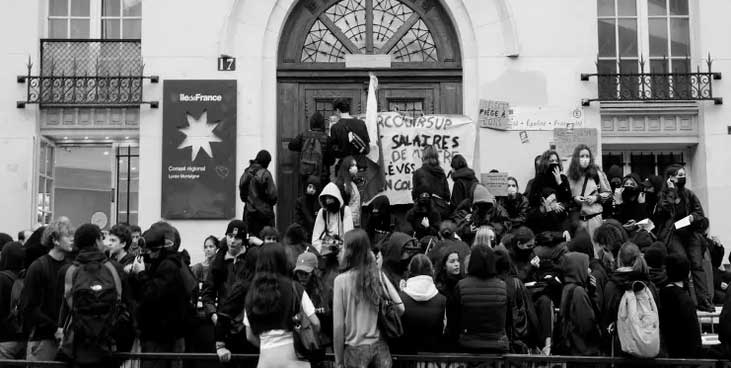

By Marc Lassalle
FOR ALMOST a year, French workers have mobilised in a series of strikes across the country.
On 18 October, 300,000 workers protestested during a day of action called by the largest unions, including CGT, FO, Solidaires and the students’ unions. On 16 October, the New Ecological and Social People’s Union (Nupes), an alliance of left parties including Jean-Luc Mélenchon’s France Insoumise, the Communist Party (PCF), the Socialist Party (PS), the Greens and other minor forces, organised a demonstration against the cost of living with more than 100,000 marching in Paris. These numbers are the highest since 2019 and are clear signals of a generalised combativity.
Challenged by the working class in action, the government of President Macron is weaker than ever. In Parliament, he is 44 MPs short of a majority and has had to resort to an anti-democratic procedure to adopt the budget law without debate. After refusing for weeks to acknowledge any problem with fuel production and distribution, he performed a sharp about-turn and resorted to ‘requisition’, an administrative measure forcing refinery workers to resume work.
Among the majority of the working class, the discontent is widespread: rising prices compared to salaries that have been held down for years, poor working conditions, the continued dismantling of the public services, the threat of another pension reform. It is no wonder the mobilisation included practically every sector including, significantly, many workers from the private sector.
General strike
Despite hundreds of general assemblies in the workplaces, the occupation of hundreds of secondary schools, generalised discussions on the need for a general strike across the workers’ movement, no sector decided to continue on ‘grève reconductible’ (it is a French tradition to renew the decision to strike every day). Despite the necessity of a general strike, and conditions that are ripe for it, it did not take place.
The reason for the current failure lies in the division inside the workers’ camp and its political weaknesses. The trade unions, including the CGT, the most radical of the large unions, do not want a general strike. This is clear after two decades of widespread movements in France against neoliberal reforms; in every case, the CGT national leadership tried to let off steam with isolated days of action. It is using a similar tactic today.
Nupes
The success of Nupes at the June general election came against the background of the resurgence of the far right Rassemblement National and its racist ideology, and after years of neoliberal reforms and partial defeats. Nupes itself suffers from deep internal divisions. The PCF and PS simply joined Mélenchon to save their MPs. Five years ago, the PS was in government, implementing similar neoliberal attacks as does Macron today, with Macron as its minister.
France Insoumise is yet another vehicle for Mélenchon to come to power within the framework of the bourgeois state. He claims repeatedly that ‘We are building a new Popular Front’. The 1936 Popular Front benefits from a positive, but largely undeserved, aura, created by the PCF. Workers then went on strike to pressure the government to improve their conditions through reforms, and to stop fascism and the war.
In the end, they got close to nothing: that government collapsed a couple of years later and the Vichy regime was installed. The whole country, indeed the whole world, soon plunged into the nightmare of the imperialist war, and Nazism pressed its iron heel on the throat of the European working class.
Mélenchon’s programme is therefore hopelessly utopian at best. His populism is actually disarming the working class, fusing it within the liberal idea of the ‘people’, praising the ‘yellow vests’, and diverting energy towards parliamentary actions rather than the class struggle, and strikes, in the workplaces.
Far left
While smaller political forces like the NPA and Révolution Permanente (FT) do call for a general strike and correctly raise the slogan of a general wage increase, they have both, for opposite reasons, adopted unilateral and false approaches to the united front. NPA adapts to Nupes and hails it as a positive recomposition of the working class without much criticism. Révolution Permanente correctly rejects the popular front approach of Mélenchon but fails to understand the need to relate to the millions of workers that voted for Mélenchon and are today mobilised. A correct understanding of the united front is vital for the French revolutionaries to make an impact in the current situation.
Despite the missed opportunity for a general strike, the situation remains explosive. As one minister declared, ‘a match might be enough’ to ignite it. The situation of widespread working class anger and combativity, combined with a weak and precarious government, will continue and even accelerate in the coming months. It is vital for French revolutionaries to correctly analyse the situation, to raise an action programme including mobilising demands, and to popularise the need for a general strike within the unions, among non-unionised workers and in the ranks of Nupes.